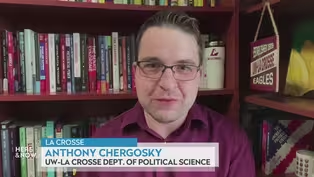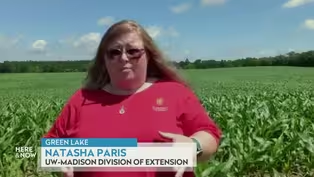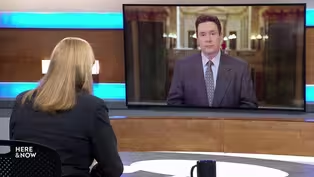Here and Now
How Wisconsin Is Creating the Future of Precision Medicine
Clip: Season 2300 Episode 2301 | 6m 3sVideo has Closed Captions
Wisconsin's federal designation as a biohealth technology hub is generating high hopes.
Rapid advances in medical research are transforming how disease is treated at an individual level — the state's federal designation as a biohealth technology hub is generating high hopes for business.
Problems playing video? | Closed Captioning Feedback
Problems playing video? | Closed Captioning Feedback
Here and Now is a local public television program presented by PBS Wisconsin
Here and Now
How Wisconsin Is Creating the Future of Precision Medicine
Clip: Season 2300 Episode 2301 | 6m 3sVideo has Closed Captions
Rapid advances in medical research are transforming how disease is treated at an individual level — the state's federal designation as a biohealth technology hub is generating high hopes for business.
Problems playing video? | Closed Captioning Feedback
How to Watch Here and Now
Here and Now is available to stream on pbs.org and the free PBS App, available on iPhone, Apple TV, Android TV, Android smartphones, Amazon Fire TV, Amazon Fire Tablet, Roku, Samsung Smart TV, and Vizio.
Providing Support for PBS.org
Learn Moreabout PBS online sponsorshipAugust 19.
For "Here& Now, I'm Aditi Debnath.
>> In medical news, Wisconsin learned this week it has been named as one of 12 technology hubs for the bio health industry, and with that designation comes nearly $50 million.
Over the next five years.
The focus is on personalized or precision Stephen Potter reports.
Wisconsin is front and center on efforts to advance precision medicine.
>> I love this machine.
>> A couple of years ago, when she was 43, Megan Haensgen had a doctor's appointment, went in and saw that colorectal surgeon.
>> He sat down, looked me square in the face and said, I'm almost 100% certain you have cancer.
And I argued.
I said, no, I'm here for my hemorrhoid.
And he gave me a minute.
And then I realized that he what he was saying.
And so that was the start of the journey.
They did a biopsy in the office that day.
Everything was very quick, rushed, definitely felt a sense of urgency.
I knew I'd been walking around with cancer for several years, so I was really scared.
cancer treatment could be done close to home, and they said no.
>> We feel strongly that this is where you need to be.
>> She had her treatment done at the Froedtert hospital campus in Milwaukee, using the Radixact Radiation therapy machine.
It's designed to deliver cancer killing beams of energy to a very focused area.
And given the sensitive spot of Haensgen cancer and the proximity to the rest of her digestive system, that's exactly what she needed.
>> As a patient.
You want as targeted of a therapy as you can get, so you don't damage healthy tissue, and so you can spare, you know, your quality of life, that kind of precision, tailor made treatment based on the individual patient's conditions, ailments and body needs is known as precision or personalized medicine.
>> And researchers say it's the wave of the medical future.
>> Every patient is a unique individual.
They have their own genetics, their own exposures, their the environment that they have been in.
And so precision medicine is this approach that could we actually learn more about each individual patient so that each patient gets the right drug at the right time?
>> Doctor Mohammad Murtaza is the associate director of the center for Human Genomics and Precision Medicine at component of precision medicine, he says, is looking at a patient's DNA.
Doctors like Murtaza work to explore how precision medicine can develop treatments for patients with ailments like asthma, COPD, kidney disease and of course, cancer.
of their therapy based on their genetic makeup?
So not just the makeup of their cancer, but actually their genetic makeup that they were born with, Murtaza says.
>> We've barely scratched the surface of what these new medical advancements can do.
>> What I see precision medicine interacting with a lot more is new advances in data science and artificial intelligence and us really make sense of this data and then make better clinical decisions.
>> But precision medicine isn't just research and patient treatment.
It's also big business.
A number of Wisconsin companies are poised to be the lead innovators in this medical revolution.
>> It's very precise, submillimeter accurate radiation.
called Accuray, which moved its headquarters to southern Wisconsin last year.
products the CyberKnife, the Radixact, which is also the form of TomoTherapy, which originated here in Wisconsin and then the precision planning software where the doctors pull in MRI and CT images and they literally paint on the image, where do they want to radiate?
And then the areas that they want to protect from radiation.
precision and personalized medicine companies operating in the state.
>> We have leaders in genomics, like exact Science for diagnostics, Illumina for DNA sequencing.
And then we have this a supply chain that's built around Plexus and Rockwell, where we actually manufacture and make things here.
And then we have the clinical institutions like UW, the Medical College of Wisconsin.
So within Wisconsin, we have the whole ecosystem of what we were calling the invent, build and deploy life cycle for personalized medicine.
>> Because of this network of companies, the federal government recently designated Wisconsin as a bio health technology hub, which may also mean an influx of money.
Lisa Johnson is the chief executive officer at BioForward, the state's bio health industry association.
She explains the objective behind the designation to fund tech hubs throughout the country in key technology areas where the United States needs to become more competitive.
The program also brings together partnerships for data collection with the intent to benefit patients.
>> That data collection that really guides now our physicians, but also certainly our innovators on where what kind of drugs should be brought to market.
It's certainly we get that data from medical imaging from our diagnostics to really guide where we should go with our drugs in the future.
>> Personalized medicine is about the right treatment for the right patient at the right time.
So the goal is to give them effective care, but also not to give them unnecessary care where they're going through unnecessary procedures, unnecessary tests.
It may be having side effects that that they don't need to face, but to really match them with what's going to address their disease.
>> For patients like Haensgen, who is now cancer free after chemotherapy and laser focused radiation, precision and personalized medicine made a life altering difference.
She hopes the advancements continue, even since the three years that I've been treated, I know that my doctors and my team at my hospital on this machine are doing things a little differently, and that's just in the last three years.
>> So I can only imagine that research and innovation just will improve going forward.
To make things even better for future cancer.
Cancer patients future cancer.
Cancer patients
Anthony Chergosky on Down-Ballot Races in the 2024 Election
Video has Closed Captions
Clip: S2300 Ep2301 | 5m 41s | Anthony Chergosky on the 2024 presidential race affecting votes for the state Legislature. (5m 41s)
Here & Now opening for July 5, 2024
Video has Closed Captions
Clip: S2300 Ep2301 | 1m 10s | The introduction to the July 5, 2024 episode of Here & Now. (1m 10s)
Natasha Paris on Wisconsin's Farms Facing Weather Whiplash
Video has Closed Captions
Clip: S2300 Ep2301 | 5m 19s | Natasha Paris on impacts of extreme weather conditions on Wisconsin's growing season. (5m 19s)
What's the Purpose of the RNC in Milwaukee, DNC in Chicago?
Video has Closed Captions
Clip: S2300 Ep2301 | 2m 52s | The RNC in Milwaukee, DNC in Chicago will command attention as the 2024 race intensifies. (2m 52s)
Zac Schultz on the Wisconsin Supreme Court and Abortion Law
Video has Closed Captions
Clip: S2300 Ep2301 | 4m 58s | Zac Schultz on the Wisconsin Supreme Court hearing cases on the legal status of abortion. (4m 58s)
Providing Support for PBS.org
Learn Moreabout PBS online sponsorship
- News and Public Affairs

Top journalists deliver compelling original analysis of the hour's headlines.

- News and Public Affairs

FRONTLINE is investigative journalism that questions, explains and changes our world.












Support for PBS provided by:
Here and Now is a local public television program presented by PBS Wisconsin




